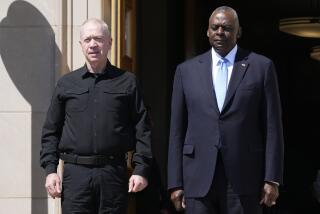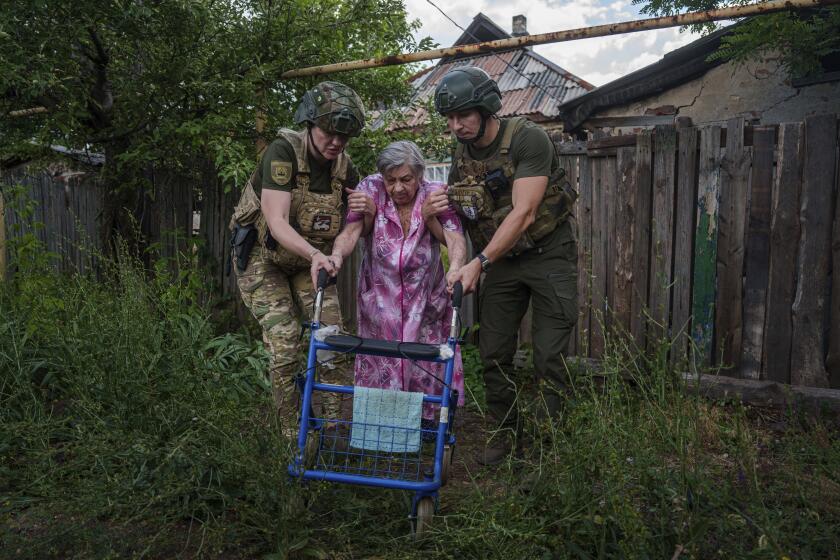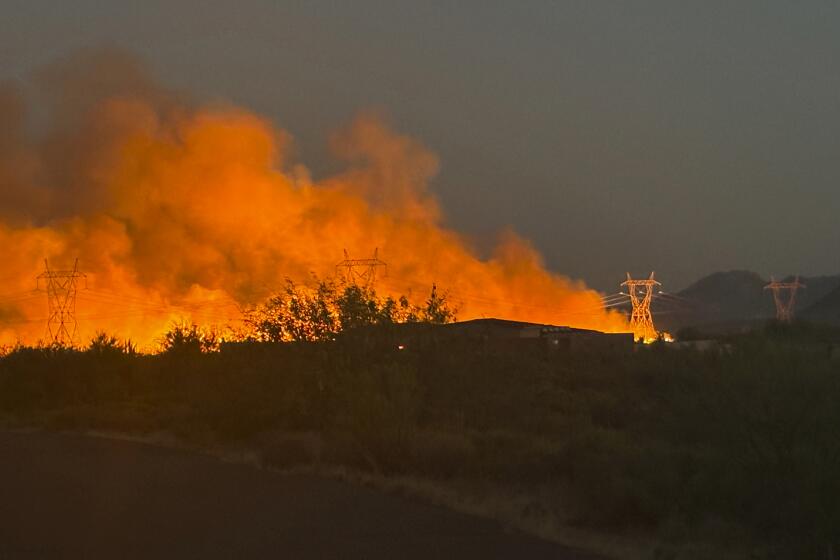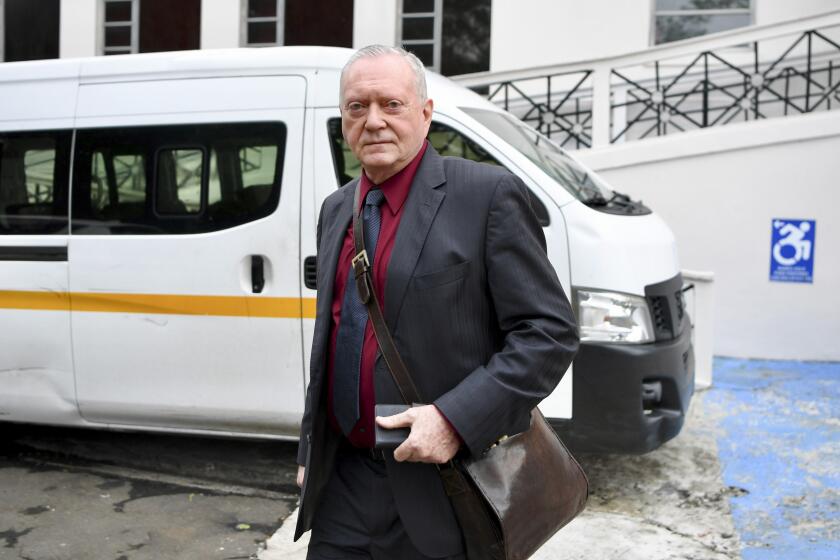Iraqis to Shoulder Responsibility for Baghdad Security
The U.S.-led occupation plans to shift control of this war-stricken city center to Iraqi forces soon and move most American troops to the capital’s perimeter, military officials said Sunday.
“Unless you give them a chance to practice their skills, to go out there and face things on their own, then you never know what they can do,” said Deputy Defense Secretary Paul D. Wolfowitz, who was visiting Baghdad for the third time since the war began.
For the record:
12:00 a.m. Feb. 6, 2004 For The Record
Los Angeles Times Friday February 06, 2004 Home Edition Main News Part A Page 2 National Desk 2 inches; 78 words Type of Material: Correction
Abizaid remark -- A Feb. 2 article in Section A, headlined “Iraqis to Shoulder Responsibility for Baghdad Security,” incorrectly stated that Gen. John Abizaid, head of the U.S. Central Command, said a formal hand-over of power from the U.S.-led coalition to a new Iraqi government is unlikely by the June 30 target date. Abizaid said only that there would not be a military pact outlining the roles of the United States and Iraq by the end of June.
“But clearly it’s better for us if they are on the front lines, and it’s better for them and it’s better for their country.”
U.S. commanders and officials with the U.S.-led civilian administration outlined their plans to a small group of reporters accompanying Wolfowitz, a key architect of the Iraq war. It was Wolfowitz’s first visit to the capital since October 26, when insurgents fired rockets at the Rashid Hotel, where he was staying.
On Sunday, Wolfowitz said Iraqi forces would prove more effective than their American counterparts in combating guerrilla forces like those that had bombed two Kurdish political party complexes earlier in the day.
Brig. Gen. Martin Dempsey, the top U.S. commander in Baghdad, said the shift to Iraqi forces would begin during the rotation of about 250,000 U.S. troops in the next few months.
The United States will reduce the number of U.S. operating bases in Baghdad and move most to the outskirts before the 1st Armored Division hands over security in April to the incoming 1st Cavalry Division, from Ft. Hood, Texas. In northern Iraq, three brigades of the 101st Airborne Division will be replaced Thursday by a single 2nd Division brigade from Ft. Lewis, Wash.
The diminishing profile of American forces is part of an effort to cede the leading role in security to Iraqi troops. Senior officials in the U.S.-led coalition governing Iraq acknowledged Sunday that even if a representative Iraqi government took over as planned this summer, it would remain unable to control security.
American troop numbers are expected to remain near their current level, officials said.
“The occupying forces will move from being occupying forces to being invited forces in partnership, in some ways, with the Iraqis in defense of their country until such time as their security forces can do it themselves,” said a senior civilian coalition official in Baghdad, speaking on condition of anonymity.
The effort to transfer authority is most evident in Baghdad. The number of forward operating bases from which troops watch over the city has shrunk from 44, when 1st Armored troops took over the city from the 3rd Infantry Division in May, to 26.
Dempsey plans to cut that to eight by the time new troops assume control April 15.
“As they became more capable, it made sense for us to cede the security challenge to [the Iraqi forces],” Dempsey said at Coalition Provisional Authority headquarters in Baghdad. “And so we began building base camps for our successors that were outside the city, on the perimeter of the city, so that when our successors came in behind us, they would be on the outside looking in. We were very much on the inside looking out.”
The shifting of overall control of the capital is likely to take months. Military strategists estimate that Baghdad needs 19,000 Iraqi police officers. It has 8,000, and U.S. forces are training as many as 2,000 each month, in Baghdad and Jordan. A formal hand-over of power from the coalition to a newly representative Iraqi government is unlikely by the target date at the end of June, Gen. John Abizaid, head of the U.S. Central Command, which is directing operations in Iraq, told defense reporters last week.
Critics say the Bush administration has other considerations in withdrawing from the city center and the Iraq conflict. As the presidential election approaches, the same critics say, Bush’s strategists recognize that the constant drumbeat of U.S. casualties could hurt his chances for reelection.
U.S. officials here say the Iraqi public is growing increasingly restless and wants more autonomy.
“There is a point of diminishing consent for them wanting us to be here. They enjoy the security. They like what we are doing. They enjoy our presence. But I don’t think many of them want us here all the time,” said Brig. Gen. Mark Hertling, the 1st Armored Division’s assistant commander.
“They want their security forces taking care of them.”
The gradual tilting of authority toward Iraqis is accelerating amid what military officials describe as the largest rotation of military forces engaged in combat since World War II. About 120,000 troops are due to leave Iraq and be replaced over the next four months.
More to Read
Start your day right
Sign up for Essential California for news, features and recommendations from the L.A. Times and beyond in your inbox six days a week.
You may occasionally receive promotional content from the Los Angeles Times.






